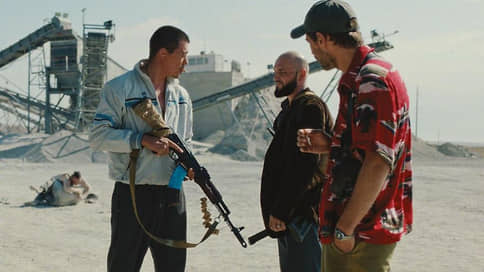Machiavelli in the steppes
[ad_1]

The “Goliath” by the Kazakh Adilkhan Yerzhanov, created in co-production with Russia, was released. Why it’s important not to miss this rare film in an impoverished repertoire, explains Andrey Plakhov.
Forty-year-old Yerzhanov is a phenomenon of the new Kazakh cinema. In fifteen years of work, he made fifteen films: an enviable pace. Almost every one of them gets to the largest international festivals – from Cannes and Venice to Rotterdam, from San Sebastian to Moscow – and resonates noticeably at each of them. However, at home, these films are known more by hearsay, and in Russia, Goliath is Yerzhanov’s first film awarded theatrical release.
This director directs and produces “guerrilla cinema” – incredibly bold, even considering that it does without government financial injections. In today’s Russia, this is hard to even imagine. Yerzhanov is absolutely free both in exposing the authorities and in juggling with art forms. He combines naturalism with Brechtian estrangement, surrealist grotesque and social satire with musical and Far Eastern action – and as a result creates a strong image of an absurd and ruthless world. Its focus is the fictional village of Caratas – an analogue of Macondo, invented by Gabriel Marquez and largely written off from the city of his childhood.
The action of “Goliath” is also played out in Karatas, which is under the heel of the criminal authority Poshaev. A trouble-free vertical of power has been built here, built on humiliation and fear. The godfather gives the locals jobs, but mercilessly cracks down on those who show the slightest sign of discontent. The bespectacled wife of the lame-legged poor man Arzu, who dared to complain about the local authorities, will face reprisals, and Poshaev takes the heartbroken Arzu himself under his guardianship and carefully monitors with the help of his guardsmen so that it does not occur to him to take revenge. As an illustration of this collision, a quotation from Niccolo Machiavelli’s “The Prince” is given: “A person can avenge a small evil, but cannot avenge a big one; from which it follows that the offense inflicted on a person must be calculated so as not to be afraid of revenge.
This is not the only aphorism of the cunning Florentine used in the film. Its final part is commented as follows: “I taught sovereigns to become tyrants, and subjects to get rid of them.” But much more interesting than the ancient wisdom is the modern “Machiavellianism” that sounds from the lips of the same Poshaev. “Power is the same everywhere. Do you think it’s different in England, in America? Their democracy is a lie. Only there everything is separate: the army, the police, the tax authorities, and we have everything rolled into one, it will not work out differently. They also act tough, just do not show. And I’m open, but honest.
There is something painfully familiar in these arguments from the evil one: obviously they are popular not only in Kazakhstan. One of the fundamental principles of Karatas morality breathes with relatives: “Common fund is a sacred thing.” Regardless of the denomination, the manipulation of religious consciousness is in progress. One of the characters instructs the protagonist with quotes from the Koran, where, as in any of the sacred books, one can find directly opposite maxims. And about the need to forgive and establish peace. And about the fact that equal evil becomes the reward for evil.
The lame stutterer Arzu, beautifully played by Berik Aitzhanov, is a living illustration of how totalitarian power plays on human instincts, but still pierces at some point. Daniyar Alshinov assumes no less ideological burden, having confirmed the status of a new star of Kazakhstani cinema in the role of Poshaev. He became famous for his role as an avenging investigator in the same Yerzhanov’s film “Black, Black Man”, and in the new film he is just as convincing in the role of a self-proclaimed satrap.
Russian actors Dmitry Chebotarev and Alexandra Revenko organically fit into the Kazakh ensemble. In general, it’s great that the Russians acted as co-producers of this ambitious project. The Russian language sounds in the film on a par with Kazakh, and a significant share belongs to the obscene language, in which the characters of this neo-western about modern David and Goliath speak. Alas, the authenticity of this speech in the Russian box office bashfully beeped.
[ad_2]
Source link






